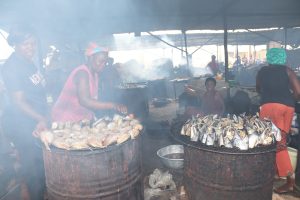International frameworks like ILO’s Convention 188 and the SSF Guidelines offer valuable tools for protecting the rights of Africa’s small-scale fishers
This article is by Gaoussou Gueye (gaoussoug@gmail.com), President, African Confederation of Professional Artisanal Fishing Organizations, CAOPA, Mbour, Senegal
The small-scale fisheries (SSF) sub-sector provides employment and food security to over 10 million people in Africa’s coastal communities. The COVID-19 pandemic raised new challenges, exacerbating precarious working conditions. It is crucial to guarantee decent working conditions for all players in the sector, including small-scale fishers in the informal sector.
In several African countries, SSF is characterized by a large informal sector, wherein workers are often subjected to difficult working and living conditions. International frameworks for improving working conditions and protecting the rights of small-scale fishers—even in the informal sector—draw from several legal instruments. They include: the International Labour Organization’s (ILO) Convention 188 (C188) on Work in Fishing; the Voluntary Guidelines for Securing Sustainable Small-Scale Fisheries in the Context of Food Security and Poverty Eradication (the SSF Guidelines); the United Nations Convention on the Law of the Sea; FAO’s Code of Conduct for Responsible Fisheries; and the Voluntary Guidelines on the Responsible Governance of Tenure of Land, Fisheries and Forests in the Context of National Food Security.
The C188 provides for progressive implementation, allowing countries to take account of the specific characteristics of the informal sector and adapt measures accordingly. SSF Guidelines encourage countries to promote the protection of workers in the SSF sub-sector, paying particular attention to guaranteeing women’s access to essential services and improving working conditions throughout the value chain.
Forced labour and debt bondage are persistent issues in SSF, affecting women, men and children, both resident and migrant. The C188 and the SSF Guidelines call on countries to take measures to eradicate these practices and ensure decent working conditions for all fishworkers.
Migrant fishers play an important role in SSF, but they often face specific challenges in terms of rights and working conditions
Efforts must be made to strengthen controls and inspections, raise awareness among those involved in the sector and promote transparent and fair recruitment mechanisms. It is also crucial to ensure that victims of these practices have access to legal remedies and appropriate assistance.
Small-scale fishing communities often confront crime, violence, piracy, sexual abuse and corruption. The SSF Guidelines encourage all parties to create conditions conducive to fishing and fishing-related activities in a safe and crime-free environment. To achieve this, it is essential to strengthen co-operation among stakeholders in the sector, civil society organizations and the relevant authorities. Only then can we combat these scourges and protect the rights of small-scale fishers. Measures must also be put in place to prevent, protect and care for victims.
Migrant fishers play an important role in SSF, but they often face specific challenges in terms of rights and working conditions. The SSF Guidelines encourage national governments to coordinate migration of fishers and fishworkers in small-scale fisheries across national borders.

Promotion of fair and equitable integration of migrant fishers and fishworkers into sustainable fisheries is crucial to ensure that they benefit from the same rights and protections as resident fishers and fishworkers.
Victims of violence and abuse in SSF must have effective and rapid access to justice. States are called upon to put in place accessible and appropriate complaint and redressal mechanisms, and to strengthen the capacities of those involved in the sector and of the relevant authorities to combat these practices and protect the rights of victims.
Protecting the rights of small-scale fishers in the African SSF sector is a major challenge. International frameworks such as C188 and the SSF Guidelines offer valuable tools for improving working conditions and guaranteeing fundamental rights for all those involved in the sector. It is crucial that African countries ratify and implement these instruments, in collaboration with SSF professional organizations and other stakeholders, to build a sector that is more sustainable, equitable and respectful of human rights.
For more
Fighting for space
https://icsf.net/wp-content/uploads/2021/06/56_art10.pdf
A Health Check
https://icsf.net/wp-content/uploads/2021/06/3186_art02.pdf
C188 – Work in Fishing Convention, 2007 (No. 188)
https://normlex.ilo.org/dyn/normlex/en/f?p=NORMLEXPUB:12100:0::NO::P12100_ILO_CODE:C188
Voluntary guidelines on the responsible governance of tenure of land, fisheries and forests in the context of national food security
https://www.fao.org/4/i2801e/i2801e.pdf